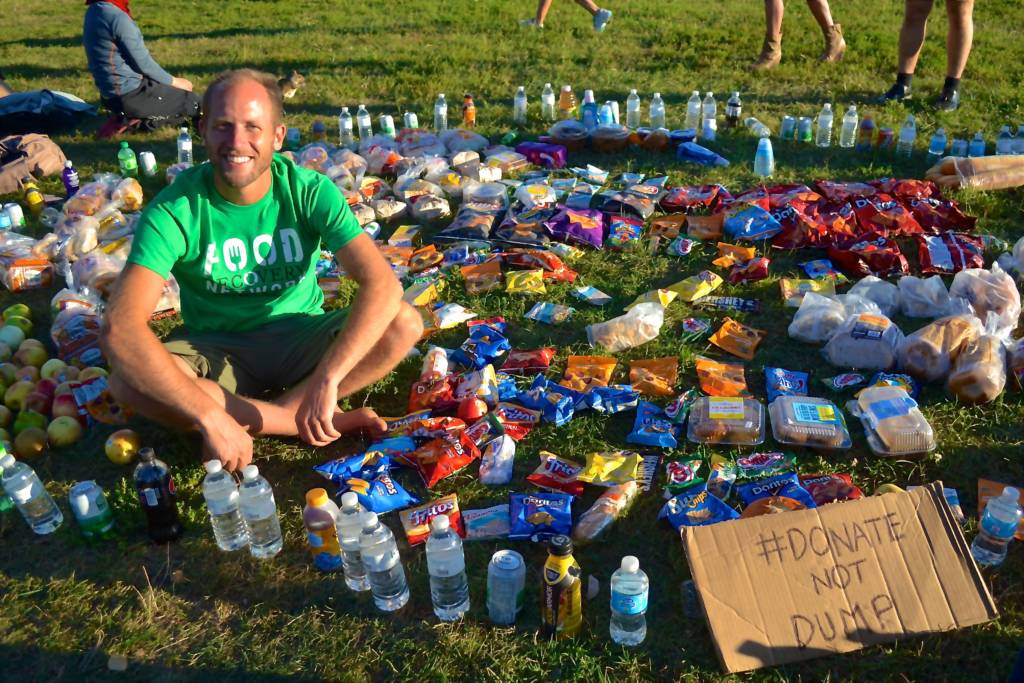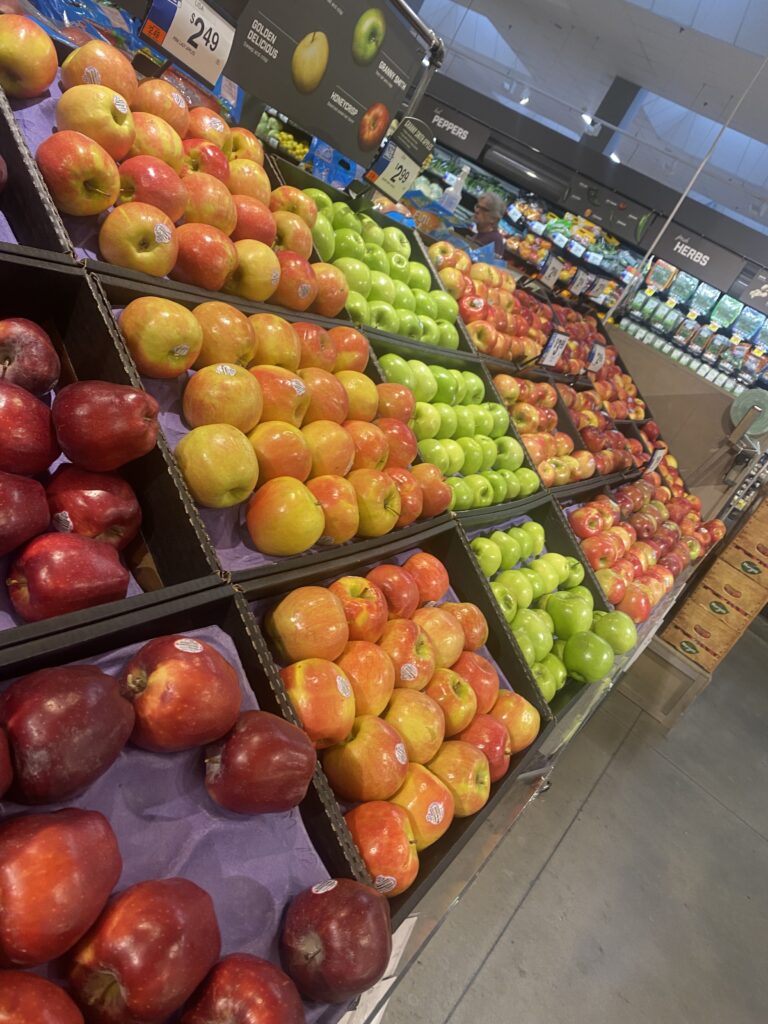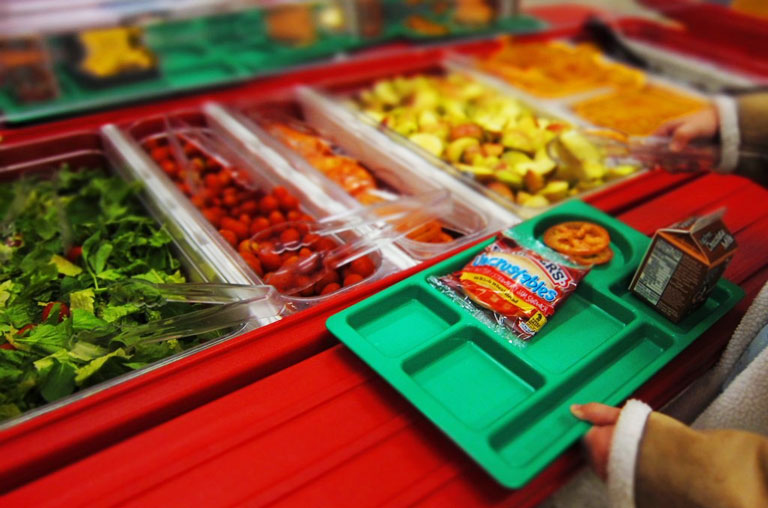Rob Greenfield unloaded the trunk of a rental car at the corner of 7th and Madison, NW and trudged to the National Mall, lugging trash bags and boxes. Then he emptied all the contents onto the grass of America’s Front Yard.
He surveyed what lay around him: entire loaves of bread, bags of chips, apples and oranges and onions and more.
All this food could still be consumed. Yet Greenfield explained he had found every bit of it in the dumpsters of area supermarkets and restaurants.
“It really looks like a lot of food, doesn’t it? There is so much bread,” Greenfield said, surveying the somewhat unusual picnic.
On Sept. 16, Greenfield hosted what he called a “Food Waste Fiasco.” The San Diego native has been dumpster-diving his way across the United States since early last summer via bicycle to raise awareness about food waste.
At the National Mall, the food activist quickly drew attention from curious passersby. He met each of them with a smile and a friendly hug, explaining to them that what they were looking at was all perfectly good food he had found in dumpsters.
A young woman named Alejandra Diaz came skating by and stopped to see what was going on. When Greenfield told her she could take some of the food, tears almost welled up in her eyes.
Diaz was visiting from Colombia. She didn’t have any money, so she hadn’t eaten anything in a day and a half. Diaz was overjoyed that she would be able to have something to eat. She was astounded to find out all the food in front of her had come from dumpsters.
“Can you imagine, if [food retailers] waste this quantity of food in every single place, it will be too much food. And there are so many people dying of hunger,” she said.
Diaz ended up taking a few items including a loaf of bread and some apples with her after the event.
Interactions like this have surprised Greenfield, who embarked on his trek not expecting people either to be so intensely interested nor willing to eat the food he found.
“My original intention was never for people to even eat it. The cool thing is that people are taking the food and eating it, so the fiascos are actually feeding, say, 100 people and moving a couple thousand dollars worth of food from dumpsters, while creating a bigger idea, and showing people the nationwide problem,” Greenfield said.
His journey began after he did some research and discovered that Americans throw away an estimated $165 billion of food a year. The idea of such waste moved him to take action.
Greenfield’s first experience dumpster diving came from a weeklong experiment late last year in which he tried to live off dumpster food for a week. He’s become a pro through all his experience in plowing through dumpsters, he said.
On this leg of his ride across the country, Greenfield spent four hours diving through dumpsters in suburban Washington, gathering food. He brought his findings to the National Mall and arranged them to make his latest visual display and drive home his point about waste. Washington is among the eight major cities he is visiting.
Preserving food is just one of many things Greenfield has done to spread awareness about conservation. He is certainly no stranger to the concept of “freeganism,” a lifestyle aimed at minimal use of the earth’s resources.
“I wouldn’t call myself a freegan; I’m just human. But by definition, yes, I would be considered a freegan,” he said.
In his months traveling, Greenfield said he’d seen some pretty crazy stuff in dumpsters, and he added a new item to his list after his Washington dumpster search.
Greenfield found a sealed gift box of chocolates with no expiration date in sight, so he opened it and started snacking.
There is an element of street theater in what Greenfield does. In the past year, he has involved himself in numerous campaigns to encourage change, from traveling in a suit made of dollar bills to make a statement about getting money out of politics, to showering only in natural water sources to conserve the earth’s most vital resource.
The campaign against food waste is just the latest. In spite of the daily disposal of tons of useful groceries, Greenfield’s research and firsthand experience have taught him that many stores remain hesitant to donate their overstocked and near-expiration-date food to nonprofits and food banks.
He pointed to a study conducted by the University of Arkansas School of Law, which revealed that businesses are reluctant about giving away excess food due to concerns about potential risks of foodborne illnesses, allergen exposure and other negative consequences.
Many of those businesses don’t know, however, that they are protected under the Bill Emerson Good Samaritan Food Act, originally signed into law in 1996 by President Bill Clinton. The act protects donors from any kind of liability when they donate food to local nonprofits.
Greenfield intentionally does his dumpster diving during the day so that when store managers come out and question what he’s doing, he can explain to them that they’re safe donating the food.
Everybody can take part in conserving good food, Greenfield said. His suggestion? Lead by example.
“Simply shop at businesses that don’t waste food in the first place. Your local farmers markets and co-ops are a lot less wasteful. Only buy what you need, and compost what you’re not able to finish.”
To find out more about what Greenfield is doing, visit his website at www.robgreenfield.tv.








